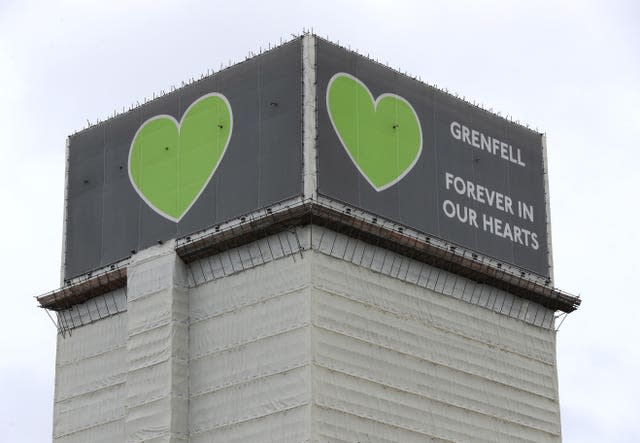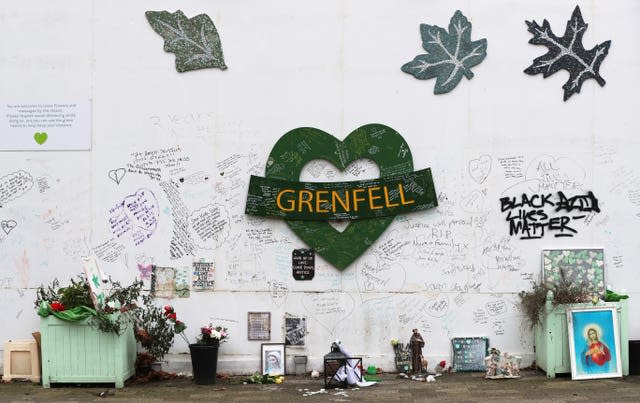Grenfell Tower fire: ‘Wrong and unfair’ to blame manufacturer of cladding panels
It would be “wrong and unfair” to pin the blame for the Grenfell Tower fire on the manufacturer of the building’s cladding panels, the company has told an inquiry into the 2017 disaster.
Stephen Hockman QC, speaking on behalf of cladding giant Arconic, told a hearing on Tuesday that the company’s product was used in a “wholly unorthodox and irregular cladding system” on the west London tower, for which the firm “bore no responsibility”.
Arconic, formerly known as Alcoa, supplied the Reynobond 55 cladding panels with a polyethylene (PE) core that were used in the refurbishment of Grenfell Tower, and were later found to have fuelled the blaze which claimed 72 lives.
In 2019, inquiry chairman Sir Martin Moore-Bick concluded the “principal reason” the flames shot up the building at such speed was the combustible cladding which acted as a “source of fuel”.
But Mr Hockman said this conclusion could now be placed in a “far wider” and “more accurate” context following evidence presented to the long-running inquiry.
He highlighted issues such as lack of maintenance of fire protection systems, the failure of compartmentation and reliance on the stay-put policy as some of the “extraordinary range of factors” that were “ultimately responsible for the tragedy to a far greater extent than the role played by any individual product”.
Mr Hockman insisted the aluminium composite material (ACM) panels were “capable of being used in a safe and compliant manner”.

He told the inquiry “the tragic outcome of the Grenfell Tower fire resulted not from the use of ACM PE but from the way in which it was used… in combination with a wide range of other combustible material”.
He said the company had “no control” over what materials were used with its product and in what arrangements.
Mr Hockman said the inquiry had heard evidence from a facade expert who confirmed that “a reasonably competent cladding contractor ought to be aware of the combustibility of ACM cladding”.
He said anyone concerned with the choice or use of ACM had the option to check the combustibility with the manufacturer.
“None of those responsible for the refurbishment can escape their share of responsibility by claiming ignorance,” he added.
Mr Hockman’s comments were made as part of Arconic’s closing statement for the inquiry’s modules examining the refurbishment of Grenfell Tower and the marketing and testing of products used.
Michael Douglas QC, presenting a closing statement on behalf of fire safety consultants Exova, said the company was “frozen out” of the project, and Rydon, the firm that became the main contractor in 2014, had “consciously and deliberately” chosen not to appoint Exova as part of the design team.
Mr Douglas said Exova was not consulted on the choice of ACM cladding panels, claiming that architects Studio E had approved the final cladding design without “seeking independent advice about the suitability of the proposed materials”.
He said Rydon had argued “forcefully” that ACM was an appropriate material to use on the exterior of a building, adding that they were “to blame for putting financial self-interest before all other considerations and never giving fire safety a second thought in the process”.
Paul Hyett, architectural expert witness to the inquiry, previously claimed advice given to Studio E by Exova was “unqualified” and “not acceptable”.
The inquiry has also been told how an Exova consultant produced three fire strategy reports between October 2012 and November 2013 that said proposed changes at Grenfell would have “no adverse effect” in relation to external fire spread.
Mr Douglas said that the report was “explicitly caveated” with its position needing to be confirmed in a later report.

The inquiry previously heard that Arconic allegedly failed to disclose “disastrous” fire test results and that the type of panel used on Grenfell with a cassette fixing performed “spectacularly worse” in fire tests than other options.
Geraint Webb QC, representing Kingspan, an insulation industry leader, said Arconic “knew or should have known that the (ACM) product was unsafe and not suitable for use on tall residential buildings”.
Kingspan, which made K15, a popular phenolic foam insulation used in a small quantity on Grenfell, played no role in the design or installation of the cladding system, Mr Webb said.
He acknowledged “certain shortcomings” over some aspects of Kingspan’s testing of K15, but said these had “not resulted in anyone being misled in any material way”.
The inquiry has previously heard evidence that Kingspan changed the composition of the product after 2005 without amending marketing material.
Craig Orr QC, representing Celotex, which made the Rs5000 insulation used within the tower’s cladding system, said the inquiry should reject Arconic’s claim that its ACM cladding was capable of being used in a compliant way in high rise buildings.
Mr Orr said Arconic’s technical manager Claude Wehrle had warned that ACM PE was “dangerous and unsuitable for use on cladding facades”.
During the inquiry Celotex employees have faced questions about the manipulation of a fire safety test to secure a pass for its combustible Rs5000 product for use on high-rise buildings.
In a previous statement the firm said during its investigations after the Grenfell blaze “certain issues emerged concerning the testing, certification and marketing of Celotex’s products” which involved “unacceptable conduct on the part of a number of employees”.
It added: “They should not have happened and Celotex has taken concerted steps to ensure that no such issues reoccur.”

 Yahoo News
Yahoo News 
